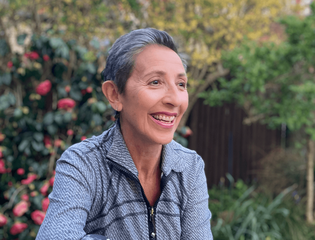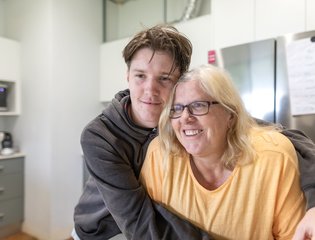Genetic testing: Why would I be tested if I have no family history of cancer?
Most of the time, the stories you hear about the faulty genes linked to ovarian cancer involve people being tested after close relatives are diagnosed with cancer, and they have a clear pattern of cancer going back generations.
The new guideline from NICE, as well as an NHS England pilot, are now offering genetic testing to certain populations even when they have no family history of cancer.
So, why would someone decide to get tested without a strong family history of cancer? Our Special Projects Manager Jo Stanford looks into this.
Understandably, the focus when thinking about the risk of carrying faulty genes like BRCA1/2 and Lynch Syndrome is often on family history, which means the pattern of people in your family tree who have been diagnosed with cancer. For many people with one of these faulty genes, they have discovered their risk as a result of sadly losing family members to cancer.
As a BRCA gene fault carrier myself, my experience followed the common pattern of cancer dotted through our family tree, culminating in my mum’s ovarian cancer diagnosis. This led to further research into our family history which found that cancer was much more widespread than we’d thought. It was only after my mum died that we got her results that she’d tested positive for a BRCA gene fault, and I then decided to get tested myself. However, this was largely down to luck and timing of this possibility being raised and my mum then putting a lot of effort into tricky conversations to gather the information on our family tree. If that hadn’t happened, I may well have not had a “significant” history to report and still not know my risk.
In fact, the reason these gene faults were discovered was through noticing patterns in families. BRCA1/2 stands for “Breast Cancer” and these genes were initially discovered through looking at families where many people going back several generations were diagnosed with breast cancer. Lynch syndrome was similarly discovered after studying families with lots of cases of cancers like bowel, ovarian and womb.
The issue here is that the traditional way of identifying people who would be eligible for genetic testing relies on having this significant family history, with each additional case increasing the chances of there being a gene fault. Although over the years the threshold you must reach to access testing has gotten lower, using these criteria alone will miss anyone who carries a faulty gene but hasn’t had cancer in their family yet. It turns out that around 50% of people with a faulty BRCA gene don’t have a family history of cancer1.
This is one of the reasons why people diagnosed with certain cancer types are now eligible for genetic testing (or testing of the tumour as a precursor to genetic testing) at diagnosis, regardless of whether the person has family members with cancer. This includes the most common types of ovarian cancer, colorectal cancer, womb cancer and breast cancer (dependent on type and age at diagnosis).
Currently, beyond research trials, we do not perform whole population testing in the UK (meaning we don’t offer everyone genetic testing). The exception is if you have any Jewish or Greenland ancestry. This is because we know from decades of research that these populations are more likely to carry certain “founder variants” that have been passed down through hundreds of years.
So why would someone carry a gene fault and not have any family history to report?
Some family trees by their nature end up looking “low risk”. For example:
- A small family: A smaller number of family members means fewer people to potentially develop cancer in the first place. None of these gene faults are a guarantee of cancer, they increase risk, but do not mean everyone with the fault will develop cancer. A family where each generation has more people, will inevitably have more people develop cancer than families where there are fewer people.
- A male-heavy family tree means that gene faults like BRCA (that have a higher cancer risk for female cancers like breast and ovarian) can be passed down without family members developing cancer themselves. BRCA2 gene faults increase a man’s risk of prostate and breast cancer, and both BRCA1 and BRCA2 increase the risk of pancreatic cancer, but the overall lifetime risks are not high enough that it would be a surprise if none of the male family members had developed cancer.
- Incomplete family history: It can be very hard to find out about medical history from many years ago, and it can also be emotional to discuss with older family members who have lost loved ones. Sometimes the facts have been lost along the way which leads to a family tree that looks low risk.
- Confidentiality: Similarly, not everyone is comfortable being open about their health issues, even with their family members. It isn’t uncommon to find out that a family member in years past had an illness that only very close family knew about. This can also cause confusion about what exact health issues were involved, even when they are hinted at. For example, in some families, details about gynecological issues have been glossed over so as not to share the details, and you may find “stomach issues” or “women’s problems” were actually cancer of the ovaries or womb. Sometimes they are not mentioned at all. This can make it tricky to gather the information, and lead to the family tree looking like there is no cancer.
- Family members passing away from other causes: if family members have passed away at an early age from other causes, for example in an accident, they may have carried a gene fault but did not live to an age where they would have developed cancer. On your family tree this would look as though they were unaffected. This is why it’s always important to note down the age cause of death of each person on your family tree where possible, as a genetic counsellor can take this into account.
- Not realising other cancers are involved: Awareness that breast cancer can run in families is increasing, and to a lesser extent ovarian, but many people are unaware that these genetic faults can be linked to other cancers such as pancreatic and prostate cancer for BRCA, and bowel, stomach, womb cancer (and others) in Lynch syndrome. This means they may not mention these or note them down. We’d always advise to write down all the health issues you can find out about on your family tree, and consult our Hereditary Cancer Risk Tool or an expert to find out whether there is a pattern to look into.
Will having less family history impact my risk of cancer if I’m found to carry one of these gene faults?
If you are tested and found to carry one of these faulty genes, you will receive personalised advice from a genetic counsellor, who will look at all aspects of your risk and advise you as an individual. This will include looking at your family history to estimate your risk. For example, research suggests that for women with a BRCA1 or BRCA2 gene fault, her own risk of breast cancer is higher if she has a relative with breast cancer2.
You may notice that the lifetime risk statistics are given as bands, rather than a single number. Part of the reason for this is that we do think that a person’s risk is dependent on many factors, which is why every study seems to report a slightly different figure for risk. The initial studies were done on families with many cases of cancer, and we are learning all the time as to how our genes and environment interact to impact our risk.
Several pieces of research also have suggested that the specific spelling error, and where it is found on these genes, impacts what your risk will be. This could be one of the reasons that studies report different risk bands, and in the future we may understand more about where each person’s risk sits on the spectrum. It may be that the way a particular family’s total genetic makeup interacts with their environment leads to a different cancer risk to someone else with a spelling error on the same gene. All these things together may tell us why, for example, a family may carry a high-risk gene fault but not have many cases of cancer, and inform the new generation of how this might impact their choices.
Our knowledge is growing all the time, but there is still so much more to learn and it’s important to remember that if you opt to go through genetic testing- this will bring you knowledge, but it will not bring you certainty.


